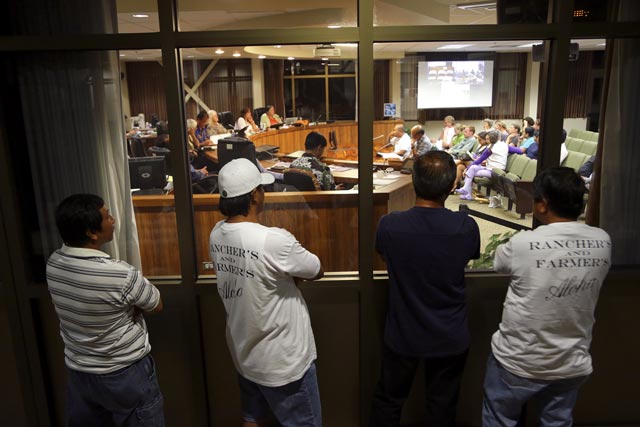
HAWAII'S GMO BATTLE: FEDERAL JUDGE STRIKES DOWN KAUAI'S PESTICIDE REGULATONS
Mike Lluldwig, Truthout
 Farmers outside a County Council chamber listen to a discussion about pesticide regulations and the planting of GMO crops on the island of Hawaii, November 5, 2013. (Photo: Jim Wilson / The New York Times)
Farmers outside a County Council chamber listen to a discussion about pesticide regulations and the planting of GMO crops on the island of Hawaii, November 5, 2013. (Photo: Jim Wilson / The New York Times)
A federal judge in Hawaii has struck down a local ordinance that would have regulated pesticide use at farms on the island of Kauai, where four of the world's largest agrichemical companies take advantage of long growing seasons to develop genetically engineered crops seeds, also known as genetically modified organisms, or GMOs.
On August 23, US Magistrate Judge Barry Kurren ruled in favor of Syngenta, BASF, DuPont Pioneer and Agrigenetics, an affiliate of Dow Chemical in their challenge of Kauai County's Ordinance 960, arguing that the local ordinance illegally pre-empted state laws regulating pesticides.
"This decision in no way diminishes the health and environmental concerns of the people of Kauai," Kurren wrote in the order overturning the ordinance. "The court’s ruling simply recognizes that the state of Hawaii has established a comprehensive framework for addressing the application of restricted-use pesticides and the planting of GMO crops, which presently precludes local regulation by the county."
The Kauai County Council passed Ordinance 960 in November 2013 after months of protests and divisive public debate that put the tight-knit island at the center of the global controversy over pesticides and GMOs.
The ordinance is one of the first grassroots attempts to regulate some of the world's largest GMO seed producers at the local level.
Residents of Waimea, a working-class community nestled between facilities operated by the four companies, are worried that pesticide drift from the GMO seed plots is poisoning local waterways and exposing their children to toxic chemicals linked to cognitive disorders and birth defects. Other activists on Kauai fought to pass Ordinance 960 because they oppose GMO agriculture in general.
The ordinance established buffer zones between GMO seed farms where pesticides are sprayed and sensitive areas like schools and hospitals. It also required the companies to notify nearby residents about pesticide applications while researchers study the impacts of the chemicals on the environment.
Although the ordinance was originally scheduled to take effect earlier this month, the court pushed that date back to October. Now it is unlikely that the ordinance will take effect in October, unless the defense quickly wins an appeal.
The four agrichemical companies on Kauai have reported using a combined 18 tons of "restricted-use" pesticides annually. Under federal law, only technicians with special training can apply restricted-use pesticides because they may pose threats to the environment or human health.
A recent investigation by the Cascadia Times found that, on average, the GMO seed companies on Kauai annually apply more restricted-use pesticides - such as chlorpyrifos - per acre than farms in most states in the mainland. The amount of restricted-use pesticides applied on Kauai is 10 times greater than the national average.
Researchers have linked some of these chemicals to health problems, especially in children. Two of the pesticides, paraquat and atrazine, are banned in the European Union but remain popular in the United States.
The agrichemical firms rigorously opposed Ordinance 960 and rallied their workers in protest as the county council considered the legislation. After the council passed Ordinance 960, the companies quickly filed a legal challenge while aggressively lobbying state lawmakers for support.
The companies claim that the GMO crop seed facilities on Kauai are an economic boon for the island and are already subject to adequate state pesticide regulations. Ordinance 960, they told the court, interfered with the existing regulatory system and put an undue burden on their operations.
Attorneys for Earthjustice and the Center for Food Safety helped Kauai County defend the ordinance in court. "This battle to protect Kauai and its residents from the effects of toxic pesticides is only just the beginning," Earthjustice attorney Paul Achitoff said in a statement. "We do not accept that people must put up with toxic chemicals being sprayed near their homes and schools and will keep fighting for their right to protect themselves."
Ordinance 960 proponents point out that Judge Kurren also ruled that the ordinance is not pre-empted by federal law, leaving room for advocates to make legislative pushes at the state level and continue fighting in federal appeals court.
"This issue is not going away. Wherever the battle is, the people will be there," said Gary Hooser, a Kauai county council member and architect of Ordinance 960. "If it’s at the state legislature, we will be there. If it’s in a court of appeal, we will be there. The people of Hawaii have learned too much to go backwards."
Copyright, Truthout. May not be reprinted without permission.
Mike Ludwig
Mike Ludwig is a Truthout reporter. Follow Mike on Twitter @ludwig_mike.
